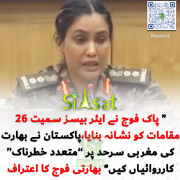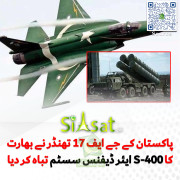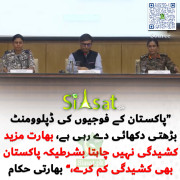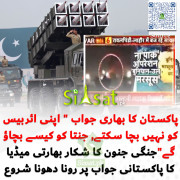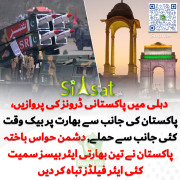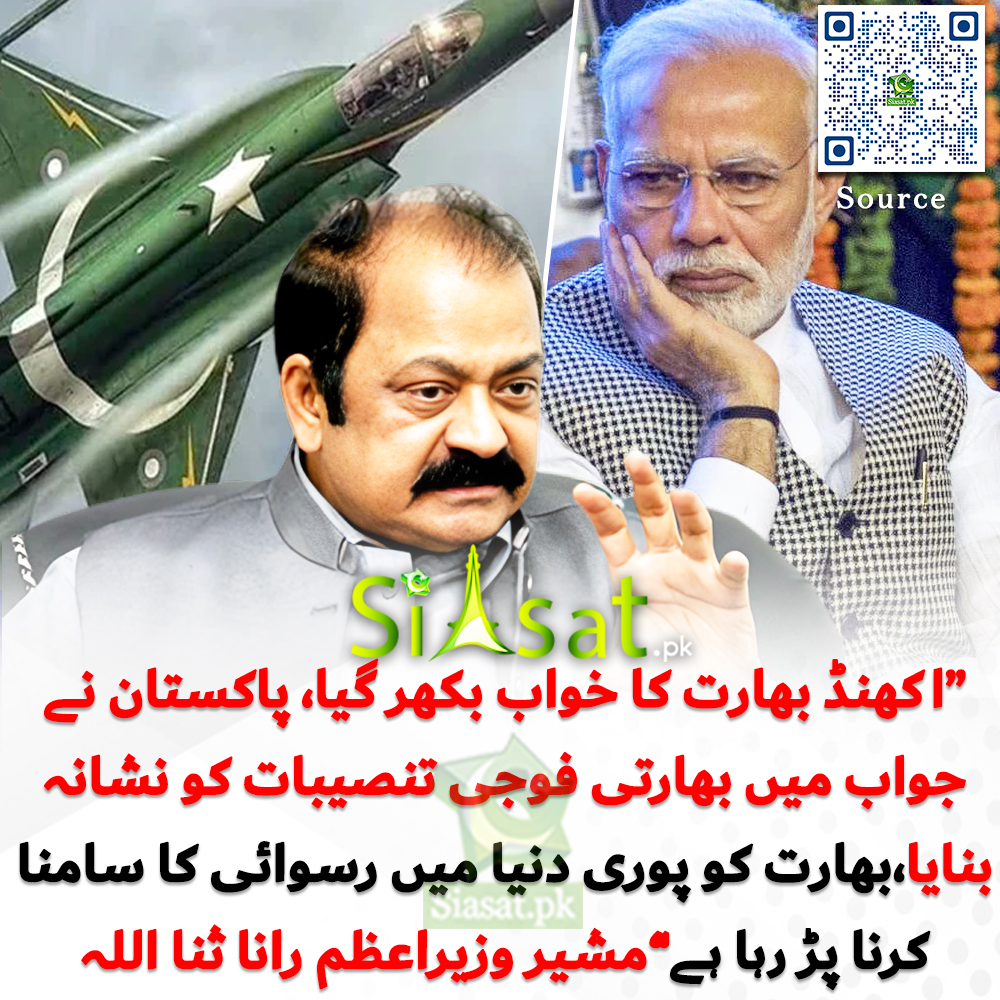A
arshad_lahore
Guest
Back to the peace process
By Shamshad Ahmad | Published: June 13, 2009
The US seems to be successfully prodding India and Pakistan back to their peace process. Under Secretary of State William Burns was in New Delhi this week with a strong message for resumption of the stalled composite dialogue. Secretary of State Hillary Clinton is also expected to visit the two countries next month to reinforce Washington's demarche. Meanwhile, positive vibes are emanating from New Delhi. Pakistan Foreign Office was quick enough to welcome the prospect of early resumption of India-Pakistan talks which India had suspended after the Mumbai terrorist attacks in November last year.
US pressure has already begun paying dividends and a significant change in the Indian mood vis--vis Pakistan is noticeable. Recent statements by Indian leadership including those by Prime Minister Manmohan Singh, President Pratibha Patil and Foreign Minister S.M. Krishna are indicative of a clear shift in the Indian position. There has been a growing realization in Delhi that its post-Mumbai intransigence was counterproductive and might only strengthen the very forces that were seeking to undermine the India-Pakistan peace process. Washington was particularly worried of the serious fall-out of this situation.
It is encouraging that Prime Minister Manmohan Singh is now asserting the importance of talks "for resolving the issues confronting the two countries" bilaterally and by the region as a whole. In his formal "vote of thanks" statement in response to the address by Indian President Pratibha Patil to the parliament's joint session last week, the Indian Prime Minister acknowledged that it was in his country's vital interest to retry to build peace with Pakistan and said "New Delhi was prepared to walk more than half way if Islamabad would accept its share of the responsibility in the partnership."
Manmohan Singh spoke his mind best when he admitted that "India cannot realise its ambitions unless there is peace and prosperity in South Asia as a whole." He recognised that it always takes two hands to clap." So finally, he seems to be convinced that instead of prolonging the mutual acrimony, it was time to grab Pakistan's hand already extended full length to jointly move ahead in pursuit of peace between the two countries which he now believes would help transform South Asia as a factor of regional and global stability.
"What is at stake is the future of one-and-a-half billion people living in South Asia," Manmohan Singh said.
Indeed, today's world is in turmoil, and South Asia, which is home to one-fifth of humanity is at the root of most of its problems ranging from unresolved disputes to violence, extremism and terrorism. But the world has not paid enough attention to these problems which in essence emanate from the unbroken legacy of India-Pakistan hostility and conflict. It is this gridlock that needs to be opened sooner rather than later. What the world now needs to understand is that global peace will remain elusive as long as the issues of peace and security in this region are not resolved.It is time a serious appraisal was made of the policy options available to the regional as well as global stakeholders in making South Asia a factor of stability for global peace and security. This no doubt presents a challenge to the world community, especially the powers that matter face, not only to manage the magnitude of the region's political, economic and social problems but also explore the pathways to bringing the prevailing India-Pakistan logjam through conflict prevention and peaceful settlement of disputes in accordance with the modalities prescribed in the Charter of the United Nations.
With overt nuclearization of the sub-continent, South Asia's problems are no longer an exclusive concern of the region itself. They now have a worrisome global dimension which raises major powers' stakes in the issues of peace and security in this region. Afghanistan and Pakistan, as pivotal partners of the West in its containment policy of the Cold War, played a decisive role in dismantling the "evil empire" of the former Soviet Union. The same two countries now constitute the pivotal frontline and battlefield of the global war on terror.
The role that Pakistan and Afghanistan are now playing to make the world safer and more peaceful is inevitably predicated on the overall political, socio-economic and security environment of South Asia and the new approaches that are made to bringing peace and stability to this region. The effectiveness of their role and capability in this process will suffer if other conflicts and disputes continue to engage and divert their attention and resources. This brings in the crucial factor of US "engagement" or "re-engagement" in South Asia's future.
Unfortunately, after the Mumbai terrorist attacks, South Asia is suffering one of the most serous crises of its history. The implications are not confined to the region itself. They threaten the global security. What the US needs to understand is that the situation in this region will not be normalised by papering the cracks. The issues underneath will have to be addressed and resolved in an equitable manner. It must address Pakistan's legitimate concerns and sensitivities over its own discriminatory policies in the region.
The US-India defence pact and the nuclear deal both have had a dreadful impact on the strategic balance in the region. Washington's discriminatory, country-specific favoritism shown to India is a negation of the criteria-based approach normally applicable to global non-proliferation regimes. Against this backdrop, no regional approach can be effective in the war on terror without addressing the India-Pakistan issues which regretfully are now finding a manifestation in the Afghan theater and worsening situation in Pakistan.
India is suspected of using its new influence in Afghanistan to interfere in Pakistan's northern and western areas. This is a matter for deep concern in Pakistan. Washington must not ignore the grim realities of this region. Pakistan cannot be an effective partner in any campaign unless its legitimate concerns are alleviated. President Obama understands this linkage. He knew that no strategy or roadmap for durable peace in the region including in Afghanistan would be comprehensive without focusing on the underlying causes of conflict and instability.
In a pre-election television interview, President Obama had pledged to encourage India to solve the Kashmir dispute with Pakistan so that Islamabad can better cooperate with the United States on Afghanistan. He was right. To keep Pakistan focused on the larger challenges in our region, the Kashmir issue has to be resolved. But a solution of this dispute must be pursued in a manner that is acceptable to the people of Kashmir. No peace will be durable if it is negotiated on unequal terms.
General Musharraf made hasty and unreciprocated gestures to keep Washington's goodwill. In the process, he eroded Pakistan's principled position and offered a "non-territorial" settlement that only legitimized the status quo with some drastic confidence building measures. Kashmir issue is not all about CBMs. It is about the future of the people of Kashmir who alone are the arbiters of their destiny. The people in both countries would welcome any innovative approach that facilitates "practical and achievable" solution of the Kashmir issue in keeping with the legitimate interests of Pakistan and the wishes of the Kashmiri people.
This process would inevitably require perseverance. The only silver lining now on the horizon is that General Musharraf is gone. We have an elected civilian government in Pakistan, and the two major political parties are publicly known to be committed to a just and honourable peace with India on the basis of negotiated settlement of the outstanding disputes. Their negotiating template is further reinforced by a political consensus reflected in their electoral manifestos. The task ahead is not going to be easy given the complexity of the issues involved. There will be no quick fixes.
The two countries must however give peace a real chance. They need to develop a clearer framework of principles on the basis of which to address their outstanding issues and organize their future relations. For this purpose, regular contact between the political leadership of the two countries would be needed. Steady improvement of relations between Pakistan and India requires further changes in the way they deal with each other. India, being the biggest country in South Asia, must lead the way by removing fears and apprehensions among its neighbours.
The "composite dialogue" must be continued to build up trust and confidence, and develop mutually beneficial cooperation. Tangible progress in conflict resolution should be visible to the people on both sides, particularly on the doables: Sir Creek; Siachen; Wullar Barrage; Trade expansion; and Visa liberalization. Mutual cooperation in counter-terrorism should be reinforced and the Joint Anti Terrorism Mechanisms be made more effective. Blame game in public must be avoided.
The writer is a former foreign secretary
By Shamshad Ahmad | Published: June 13, 2009
The US seems to be successfully prodding India and Pakistan back to their peace process. Under Secretary of State William Burns was in New Delhi this week with a strong message for resumption of the stalled composite dialogue. Secretary of State Hillary Clinton is also expected to visit the two countries next month to reinforce Washington's demarche. Meanwhile, positive vibes are emanating from New Delhi. Pakistan Foreign Office was quick enough to welcome the prospect of early resumption of India-Pakistan talks which India had suspended after the Mumbai terrorist attacks in November last year.
US pressure has already begun paying dividends and a significant change in the Indian mood vis--vis Pakistan is noticeable. Recent statements by Indian leadership including those by Prime Minister Manmohan Singh, President Pratibha Patil and Foreign Minister S.M. Krishna are indicative of a clear shift in the Indian position. There has been a growing realization in Delhi that its post-Mumbai intransigence was counterproductive and might only strengthen the very forces that were seeking to undermine the India-Pakistan peace process. Washington was particularly worried of the serious fall-out of this situation.
It is encouraging that Prime Minister Manmohan Singh is now asserting the importance of talks "for resolving the issues confronting the two countries" bilaterally and by the region as a whole. In his formal "vote of thanks" statement in response to the address by Indian President Pratibha Patil to the parliament's joint session last week, the Indian Prime Minister acknowledged that it was in his country's vital interest to retry to build peace with Pakistan and said "New Delhi was prepared to walk more than half way if Islamabad would accept its share of the responsibility in the partnership."
Manmohan Singh spoke his mind best when he admitted that "India cannot realise its ambitions unless there is peace and prosperity in South Asia as a whole." He recognised that it always takes two hands to clap." So finally, he seems to be convinced that instead of prolonging the mutual acrimony, it was time to grab Pakistan's hand already extended full length to jointly move ahead in pursuit of peace between the two countries which he now believes would help transform South Asia as a factor of regional and global stability.
"What is at stake is the future of one-and-a-half billion people living in South Asia," Manmohan Singh said.
Indeed, today's world is in turmoil, and South Asia, which is home to one-fifth of humanity is at the root of most of its problems ranging from unresolved disputes to violence, extremism and terrorism. But the world has not paid enough attention to these problems which in essence emanate from the unbroken legacy of India-Pakistan hostility and conflict. It is this gridlock that needs to be opened sooner rather than later. What the world now needs to understand is that global peace will remain elusive as long as the issues of peace and security in this region are not resolved.It is time a serious appraisal was made of the policy options available to the regional as well as global stakeholders in making South Asia a factor of stability for global peace and security. This no doubt presents a challenge to the world community, especially the powers that matter face, not only to manage the magnitude of the region's political, economic and social problems but also explore the pathways to bringing the prevailing India-Pakistan logjam through conflict prevention and peaceful settlement of disputes in accordance with the modalities prescribed in the Charter of the United Nations.
With overt nuclearization of the sub-continent, South Asia's problems are no longer an exclusive concern of the region itself. They now have a worrisome global dimension which raises major powers' stakes in the issues of peace and security in this region. Afghanistan and Pakistan, as pivotal partners of the West in its containment policy of the Cold War, played a decisive role in dismantling the "evil empire" of the former Soviet Union. The same two countries now constitute the pivotal frontline and battlefield of the global war on terror.
The role that Pakistan and Afghanistan are now playing to make the world safer and more peaceful is inevitably predicated on the overall political, socio-economic and security environment of South Asia and the new approaches that are made to bringing peace and stability to this region. The effectiveness of their role and capability in this process will suffer if other conflicts and disputes continue to engage and divert their attention and resources. This brings in the crucial factor of US "engagement" or "re-engagement" in South Asia's future.
Unfortunately, after the Mumbai terrorist attacks, South Asia is suffering one of the most serous crises of its history. The implications are not confined to the region itself. They threaten the global security. What the US needs to understand is that the situation in this region will not be normalised by papering the cracks. The issues underneath will have to be addressed and resolved in an equitable manner. It must address Pakistan's legitimate concerns and sensitivities over its own discriminatory policies in the region.
The US-India defence pact and the nuclear deal both have had a dreadful impact on the strategic balance in the region. Washington's discriminatory, country-specific favoritism shown to India is a negation of the criteria-based approach normally applicable to global non-proliferation regimes. Against this backdrop, no regional approach can be effective in the war on terror without addressing the India-Pakistan issues which regretfully are now finding a manifestation in the Afghan theater and worsening situation in Pakistan.
India is suspected of using its new influence in Afghanistan to interfere in Pakistan's northern and western areas. This is a matter for deep concern in Pakistan. Washington must not ignore the grim realities of this region. Pakistan cannot be an effective partner in any campaign unless its legitimate concerns are alleviated. President Obama understands this linkage. He knew that no strategy or roadmap for durable peace in the region including in Afghanistan would be comprehensive without focusing on the underlying causes of conflict and instability.
In a pre-election television interview, President Obama had pledged to encourage India to solve the Kashmir dispute with Pakistan so that Islamabad can better cooperate with the United States on Afghanistan. He was right. To keep Pakistan focused on the larger challenges in our region, the Kashmir issue has to be resolved. But a solution of this dispute must be pursued in a manner that is acceptable to the people of Kashmir. No peace will be durable if it is negotiated on unequal terms.
General Musharraf made hasty and unreciprocated gestures to keep Washington's goodwill. In the process, he eroded Pakistan's principled position and offered a "non-territorial" settlement that only legitimized the status quo with some drastic confidence building measures. Kashmir issue is not all about CBMs. It is about the future of the people of Kashmir who alone are the arbiters of their destiny. The people in both countries would welcome any innovative approach that facilitates "practical and achievable" solution of the Kashmir issue in keeping with the legitimate interests of Pakistan and the wishes of the Kashmiri people.
This process would inevitably require perseverance. The only silver lining now on the horizon is that General Musharraf is gone. We have an elected civilian government in Pakistan, and the two major political parties are publicly known to be committed to a just and honourable peace with India on the basis of negotiated settlement of the outstanding disputes. Their negotiating template is further reinforced by a political consensus reflected in their electoral manifestos. The task ahead is not going to be easy given the complexity of the issues involved. There will be no quick fixes.
The two countries must however give peace a real chance. They need to develop a clearer framework of principles on the basis of which to address their outstanding issues and organize their future relations. For this purpose, regular contact between the political leadership of the two countries would be needed. Steady improvement of relations between Pakistan and India requires further changes in the way they deal with each other. India, being the biggest country in South Asia, must lead the way by removing fears and apprehensions among its neighbours.
The "composite dialogue" must be continued to build up trust and confidence, and develop mutually beneficial cooperation. Tangible progress in conflict resolution should be visible to the people on both sides, particularly on the doables: Sir Creek; Siachen; Wullar Barrage; Trade expansion; and Visa liberalization. Mutual cooperation in counter-terrorism should be reinforced and the Joint Anti Terrorism Mechanisms be made more effective. Blame game in public must be avoided.
The writer is a former foreign secretary

